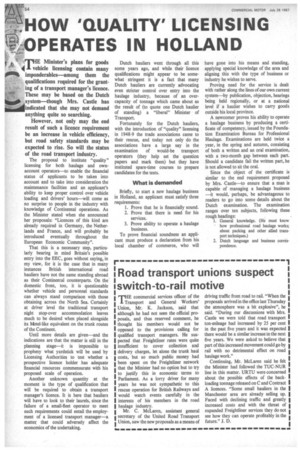Road transport unions suspect switch-to-rail motive
Page 56

If you've noticed an error in this article please click here to report it so we can fix it.
'TE commercial services officer of the ransport and General Workers' Union, Mr. K. Jackson, said that although he had not seen the official proposals, and thus reserved comment, he thought his members would not be opposed to the provisions calling for qualified transport managers. He suspected that Freightliner rates were quite insufficient to cover collection and delivery charges, let alone the trunk haul costs, but so much public money had been spent on the Freightliner network that the Minister had no option but to try to justify this in economic terms to Parliament. As a lorry driver for many years he was not sympathetic to this rescue operation for British Railways and would watch events carefully in the interests of his members in the road haulage industry.
Mr. C. McLaren, assistant general secretary of the United Road Transport Union, saw the new proposals as a means of
driving traffic from road to rail. "When the proposals arrived in the office last Thursday the atmosphere was a bit explosive", he said. "During our discussions with Mrs. Castle we were told that road transport ton-mileage had increased by 25 per cent in the past five years and it was expected there would be a similar increase in the next five years. We were asked to believe that part of this increased movement could go by rail with no detrimental effect on road haulage work."
Continuing, Mr. McLaren said he felt the Minister had followed the TUC-NUR line in this matter. URTU were concerned about the possible effects of the backloading tonnage released on C and Contract A licences. "Some small hauliers in the Manchester area are already selling up. Faced with declining traffic and greatly increased costs and with the threat of expanded Freightliner services they do not see how they can operate profitably in the future." J. D.




































































































































































